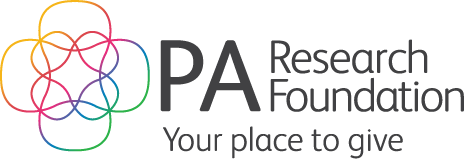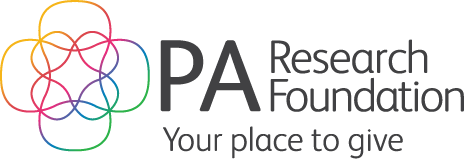
Adenoid Cystic Carcinoma is a rare and aggressive form of cancer with no known cure.
Associate Professor Fiona Simpson and the members of her PA Hospital campus-based Simpson Lab team believe they’ve figured out why, and best part of all, they’re hoping once their concept is proven, lives can be saved.
Key to their research are Eosinophils, one of several white blood cells that support the immune system.
What Fiona and three PhD students, Jenna Theron, Marion Barros and Lixue Li, have found is that unlike other tumours Adenoid Cystic Carcinomas have no Eosinophils. The theory now being pursued is that if they can introduce them in the tumour then the immune system will trigger a response.
They hope through their work introducing patient derived xenografts (pdx) into mice that this could be done via already existing medications and treatments. Best of all they have been given access to 22 xenografts from the United States to work with as well as basing their work on an actual patient from the PA Hospital.
Highlighting the importance of the work is the fact rates of the disease are increasing among younger demographics than seen previously.
“Adenoid Cystic Carcinomas have got this weird thing about them where the five-year survival rate is really good because they are the slowest growing tumour and as it gets bigger and bigger surgeons just remove it away from areas like the jugular vein,” A/Prof Simpson said.
“Then at some point it gets aggressive and really metastatic and kills the patient.
“It’s predominantly been seen in people in their 50s and 60s but a lot of our patients in Queensland now are in their 30s and 40s with young kids.”
With nothing changing in terms of treatment in more than 60 years and patient demographics shifting, Fiona and her team are on the cutting edge of creating hope for people diagnosed with ACC. But as the researcher herself puts it ‘they’re not trying to create hope for people, they are trying to fix the bloody thing’. Excitingly, Fiona, Jenna, Marion and Lixue are hopeful the work will translate to other forms of cancer with similar characteristics such as triple negative breast cancer.
“I went with PA Hospital clinician Ben Panizza to the North American surgeons meeting in the states, I was the only scientist there. There were three women there and I was in the session talking about adenoid cystic. A clinician stood after me and he was kind of embarrassed cause he's like, ‘well, I'm not talking about research. I'm just summarizing everything we've tried’,” A/Prof Simpson said.
“I sat through this talk, and it was really useful because every single target in adenoid cystic has been tried, every kind of drug, from small molecule to antibodies to checkpoint. Nothing's changed it. I thought, well, there's something wrong with that. There's something really. different about it.
“I actually sat in the meeting and I was Googling through the old 60s papers and the pathologists in the 60s recorded that they have no Eosinophils, so they've been ignored by everybody for decades.
“We're now working out that they're the very first response, including in immune checkpoints. That's been published by a Dutch group in one of the Cell journals.
“And when we were doing the EM work on all our tumors, when the therapies are working, one of the first things we see just as the tumor starts to shrink are these cells. They bring in all the other immune cells.
“Our thinking was if we replace them, then with all the years of therapy, production and testing that’s already been done, can we go back and make these therapies work?”
Another prominent factor in their research is knowledge derived from another disease, Eosinophilia, which is the presence of too many eosinophils in the body. It’s an easily managed allergy response and the research team believe by using affiliated treatments they can replace the cells in ACC tumours and ideally make a range of existing treatments viable for patients.
“The students have managed to purify the Eosinophils, these aren’t in any patient’s normal immune preps because we make them. Nobody’s been using them in any of their models.
“ACC’s are resistant to everything, there’s hardly any immune cells in there so what is going to kill the tumour?
Eosinophils bring in T Cells and B Cells and NK cells, they’re like a signaling center and they also recognise antibodies, they do different things in different parts of the body.
“We can use the Eosinophils to pull them all into the tumour and then we’ll try all the failed drugs that should have worked and see what responds.”
You can help advance the work of the Simpson Lab by making the PA your place to give here.




